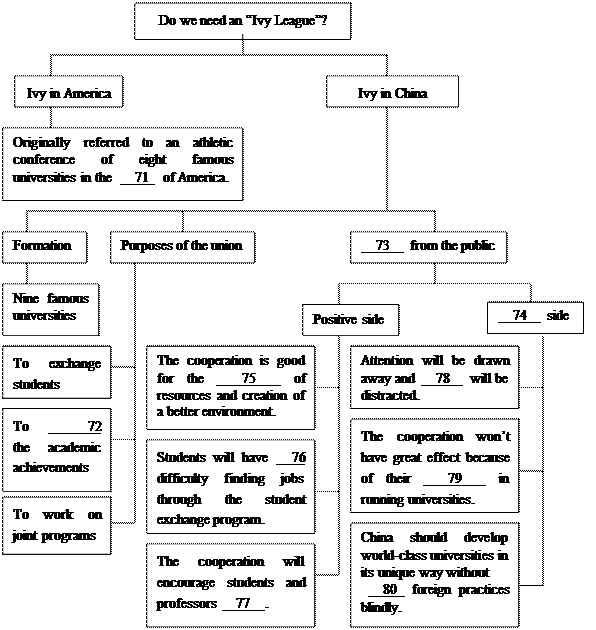
科目: 來源:不詳 題型:閱讀理解
 In the middle of the first term of school, the entire seventh grade was tested for basic skills. Steve hurried through his tests, and continued to dream of other things. His heart was in the woods, where he often escaped alone, trying to shut out the sights, sounds and smells of his alcoholic home.
In the middle of the first term of school, the entire seventh grade was tested for basic skills. Steve hurried through his tests, and continued to dream of other things. His heart was in the woods, where he often escaped alone, trying to shut out the sights, sounds and smells of his alcoholic home. 查看答案和解析>>
科目: 來源:不詳 題型:閱讀理解
 tudent exchange programs, recognition of academic achievements, and other joint programs.
tudent exchange programs, recognition of academic achievements, and other joint programs. results could be more important than lessons and achievements.
results could be more important than lessons and achievements.

查看答案和解析>>
科目: 來源:不詳 題型:閱讀理解
 heir cell phones and laptops when the plane is taking off and landing, or flying at less than 3,000 m above sea level, the official said.
heir cell phones and laptops when the plane is taking off and landing, or flying at less than 3,000 m above sea level, the official said. r ticket prices C. higher cell phone fee D. lower cell phone fee
r ticket prices C. higher cell phone fee D. lower cell phone fee查看答案和解析>>
科目: 來源:不詳 題型:完形填空
查看答案和解析>>
科目: 來源:不詳 題型:閱讀理解
查看答案和解析>>
科目: 來源:不詳 題型:完形填空
查看答案和解析>>
科目: 來源:不詳 題型:完形填空
| 21.A.answer | B.course | C.attempt | D.aystem |
| 22.A.run across | B.lead to | C.result from | D.pick up |
| 23.A.because | B.as | C.while | D.as though |
| 24.A.mentally | B.physically | C.carefully | D.actually |
| 25.A.variety | B.relaxation | C.creativity | D.machinery |
| 26.A.judgment | B.freedom | C.direction | D.comfort |
| 27.A.secret | B.skill | C.problem | D.strength |
| 28.A. amusing | B.dull | C.changeable | D.fixed |
| 29.A.use | B.create | C.supply | D.fear |
| 30.A.measure | B.invention | C.consideration | D.work |
| 31.A.lies | B.sticks | C.objects | D.contributes |
| 32.A.likes | B.equips hristmas | C.transports | D.sees |
| 33.A.tired | B.pleased | C.worrying | D.experimenting |
| 34.A.own | B.will | C.line | D.hand |
| 35.A.but | B.and | C.so | D.however |
| 36.A.extent | B.quality | C.store | D.difference |
| 37.A.natural | B.important | C.worrying | D.unbelievable |
| 38.A.Rest | B.Sports | C.Money | D.Playing |
| 39.A.complete | B.friendly | C.given | D.similar |
| 40.A.advise | B.succeed in | C.object to | D.are tried of |
查看答案和解析>>
科目: 來源:不詳 題型:閱讀理解
查看答案和解析>>
科目: 來源:不詳 題型:閱讀理解
查看答案和解析>>
科目: 來源:不詳 題型:閱讀理解
| A.Building a windbreak to protect soil | B.Building a windbreak to protect crops |
| C.Using a windbreak to improve grains | D.Using a windbreak to improve plants |
| A.do not work at all | B.do not stop wind fully |
| C.will not take place | D.will not allow wind to pass through |
查看答案和解析>>
湖北省互聯(lián)網(wǎng)違法和不良信息舉報平臺 | 網(wǎng)上有害信息舉報專區(qū) | 電信詐騙舉報專區(qū) | 涉歷史虛無主義有害信息舉報專區(qū) | 涉企侵權(quán)舉報專區(qū)
違法和不良信息舉報電話:027-86699610 舉報郵箱:58377363@163.com